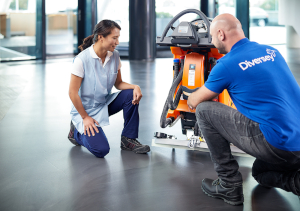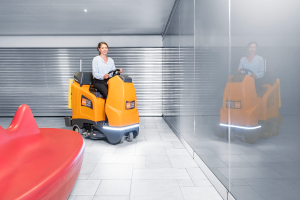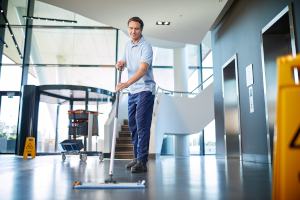Floor cleaning and maintenance are at the heart of any building care operation and industrial premises are no exception. The variety of flooring has grown as manufacturers develop new materials and products designed for better safety, greater resilience, lower costs, and other benefits. Meanwhile, innovations from floorcare suppliers aim to make cleaning and maintenance simpler, less expensive, and more sustainable. This has increased the number of options but also made choosing the right product for a particular application more complex than ever before.
The first challenge facing a cleaning team is to identify the types of flooring present. Industrial premises can have more types of flooring, each meeting different demands, than places such as office buildings, transport hubs, healthcare facilities, schools, or shopping centres. Production areas, warehouses, service centres, or design and development facilities are likely to have very robust floors designed to withstand the effects of heavy machinery and equipment while also being resistant to chemicals or liquids.
Concrete is a widely used and popular flooring material in these circumstances. Many modern mixes incorporate special additives that are designed to offer or enhance specific performance characteristics. There is also an increasing array of innovative synthetic flooring designed for appearance, low-slip performance, resilience against chemicals, or other attributes. Many floors will also have special coatings. Each type of floor and coating can have specific cleaning and maintenance requirements.
As with any type of floor it is important to identify the type and select the correct processes and products. It pays to ask the help of a cleaning supplies specialist who will have the experience and expertise to identify the floor and recommend the right combination of floorcare products and processes.
Suppliers now offer more cleaning and maintenance products than ever before with products formulated with different combinations of detergents, disinfectants, polymers, solvents, and other ingredients for each application and floor type. Given the choice, cleaning teams should be able to match the products they use very closely to their flooring types, the processes they choose and the appearance and finish they want to achieve.
This wider availability of cleaning products is reflected in the choice of floorcare equipment. The traditional mop and bucket used with a conventional cleaning product is less common but not entirely extinct. More advanced systems offer a choice of mophead materials and different product formulations. Many cleaning teams have discovered the benefits of microfibre, available in a range of disposable and reusable options which can themselves be used to clean hard floors with products or water alone. There are also specialist manual and mechanical tools for stripping old finishes and applying new ones. Mechanical rotary disc machines and scrubber driers can deliver productivity, performance, and cost-saving benefits on larger floors.
Industrial floors – especially in production areas and warehouses - are often relatively large with open spaces. High performance scrubber driers, including ride-on models, are ideal in this scenario. Like their smaller counterparts, ride-on machines can be used with a wide range of products, pads, and brushes matched to the specific floor type. Many also offer innovative features such as on-board tracking and remote management systems to optimise machine or fleet utilisation. They can also be equipped with ancillary equipment such as on-board sprayers that can disinfect floors during routine cleaning.
The increasing choice of cleaning and maintenance products and equipment means that it is more important than ever before to select the right one for the flooring material, finish, and cleaning process. Cleaning products with a formulation that is ideal for one type of flooring might be too harsh for another. An alkaline cleaning detergent, for example, might accidentally damage or remove a traditional finish. An acidic formulation on the other hand can dissolve or damage the surface of a concrete, marble, or limestone floor. When using machines, it is all too easy to choose a pad or brush that results in the cleaning operation being too aggressive or abrasive and damaging the floor. Damage can be quickly done but difficult and expensive to repair.
Experienced cleaning suppliers with a wide range of products, equipment and machines will be the best placed to offer advice and suggest the best combination for any given scenario. They will usually have floorcare specialists who have the expertise and “seen it all before” knowledge to help their customers identify the correct solutions and resolve any unexpected issues that arise. They will also be able to advise cleaning teams on compliance with agreed procedures or regulations covering specific industry sectors.
Some cleaning teams have recognised the benefits of cleaning floors with their equipment and water alone. This removes complexity by eliminating the need for any chemical products, which can save cost and the burdens associated with selection and procurement, supply chain, training, and implementation processes. It also simplifies cleaning processes, creates a healthier environment for cleaners and bystanders, and reduces routine maintenance burdens.
Microfibre mopping systems, for example, when used with water alone represent an ideal option for daily cleaning to remove dirt and dust. Floorcare machine operators are increasingly drawn to innovations such as pads impregnated with microscopic diamonds that are used with water alone and no chemicals. Fitted on scrubber driers and rotary disc machines, they offer a highly sustainable alternative to traditional techniques on a wide variety of resilient non-wooden floor types. Pads for different tasks and flooring materials are manufactured by changing the size and combination of the microscopic diamonds. The pads are typically less abrasive than the corresponding conventional alternative which helps to protect the floor while giving a smoother and improved appearance. The resulting micro-polished floor is more resistant to soiling.
Building occupiers and their cleaning teams do not always know what materials were used to construct their own facilities. But only with this knowledge can they hope to implement cleaning and maintenance regimes that deliver the best results and are affordable and sustainable. This is why it is important to seek the help and advice from an experienced supplier with a wide product range.
Written By: Terry Burt, Senior Application Expert, Floorcare, Diversey UK & Ireland



